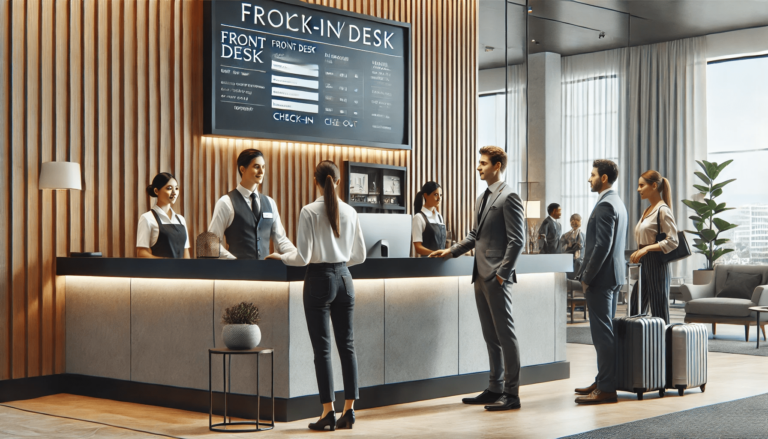Front desk operations are a critical component of the hospitality industry, serving as the first point of contact for guests and shaping their overall experience. From handling check-ins and check-outs to managing guest inquiries and reservations, the front desk plays a pivotal role in ensuring smooth and efficient hotel operations. In this article, we’ll delve into the intricacies of front desk operations, exploring the key aspects of front office standard operating procedures, the importance of managing front office operations, and best practices for front office operations in hotels. We’ll also discuss the integration of housekeeping coordination into front desk tasks to maintain seamless service delivery.
The Importance of Front Desk Operations in Hotels
The front desk operations in a hotel are often considered the heart of the hospitality experience. They not only set the tone for a guest’s stay but also serve as the central communication hub for various departments, including housekeeping. Efficient front desk operations ensure that guest needs are met promptly, creating a welcoming atmosphere that can significantly enhance customer satisfaction.
Properly managing front office operations involves more than just checking guests in and out. It requires a strategic approach to handling guest requests, resolving complaints, and coordinating with other departments like housekeeping to ensure rooms are prepared on time. The goal of effective front office operations in hotels is to provide a seamless experience that anticipates guest needs and responds to them swiftly.
Front Office Standard Operating Procedures (SOPs)
Implementing well-defined front office standard operating procedures is essential for maintaining consistency and quality in front desk operations. These procedures outline the steps that front desk staff must follow to perform their duties effectively and efficiently. SOPs cover a range of activities, from guest check-in/check-out procedures and payment processing to handling guest complaints and coordinating with housekeeping.
-
Guest Check-In and Check-Out: The check-in and check-out process is one of the most crucial aspects of front desk operations. SOPs for these tasks should detail the steps for verifying guest information, issuing room keys, and processing payments. Having clear procedures ensures that this process is smooth and efficient, minimizing wait times and enhancing the guest experience.
-
Guest Inquiries and Complaints: Effective front desk standard operating procedures should include guidelines for handling guest inquiries and complaints. This includes understanding how to listen actively, empathize with the guest, and provide solutions promptly. A well-trained front desk team can turn a potentially negative experience into a positive one by resolving issues quickly and professionally.
-
Coordination with Housekeeping: Close collaboration with housekeeping is vital for efficient front desk operations. SOPs should include procedures for communicating with the housekeeping team about room readiness, special requests, and maintenance issues. This coordination helps to ensure that rooms are prepared on time and meet the guest’s expectations.
-
Security and Emergency Procedures: The safety and security of guests are paramount in front office operations in hotels. SOPs should provide clear instructions on handling emergency situations, such as fire evacuations or medical emergencies, and outline the protocols for ensuring guest and staff safety.
Managing Front Office Operations (for office staff)
Managing front office operations involves more than just implementing SOPs; it requires continuous monitoring, training, and improvement. Here are some best practices for effectively managing front office operations:
-
Training and Development: Ongoing training is essential for maintaining high standards in front desk operations. This includes training on SOPs, customer service skills, and using hotel management software. Regular training sessions help keep the front desk team updated on new procedures and technologies, ensuring they can perform their duties efficiently.
-
Monitoring and Feedback: Regularly monitoring front desk operations helps identify areas for improvement. This can involve reviewing guest feedback, conducting performance evaluations, and analyzing operational data. Providing constructive feedback to front desk staff based on this monitoring helps them improve their performance and contributes to a culture of continuous improvement.
-
Technology Integration: Leveraging technology can greatly enhance front office operations in hotels. Implementing a robust Property Management System (PMS) can streamline check-in/check-out processes, manage reservations, and coordinate with housekeeping more effectively. Technology can also help automate repetitive tasks, allowing front desk staff to focus on more personalized guest interactions.
-
Effective Communication: Clear communication is key to successful front desk operations. Regular briefings and updates ensure that all team members are aware of daily priorities, guest arrivals, special requests, and any maintenance issues. This helps to create a cohesive team environment where everyone is working towards the same goal of providing exceptional guest service.
Best Practices for Front Desk Standard Operating Procedures
To ensure the highest level of efficiency and guest satisfaction, front desk standard operating procedures should be regularly reviewed and updated. Here are some best practices:
-
Involve Staff in SOP Development: Engaging front desk staff in developing and reviewing SOPs can lead to more practical and effective procedures. Staff members who are involved in these processes are more likely to adhere to them and suggest improvements based on their day-to-day experiences.
-
Keep SOPs Clear and Concise: SOPs should be straightforward and easy to understand. Avoid using overly technical language or jargon that could confuse new staff members. The clearer the procedures, the more effectively they can be implemented.
-
Regular Updates and Revisions: As hotel operations and guest expectations evolve, so too should SOPs. Regularly revisiting and revising front desk standard operating procedures ensures they remain relevant and effective in addressing current challenges and opportunities.
-
Incorporate Feedback Mechanisms: Encourage front desk staff to provide feedback on SOPs and suggest changes based on their experiences. This continuous feedback loop helps identify areas for improvement and ensures that SOPs remain practical and effective.
The Role of Housekeeping in day to day Front Desk Operations
Housekeeping plays a crucial role in supporting front desk operations. Effective coordination between these two departments is essential for ensuring that rooms are ready for new guests and that any special requests are fulfilled. The front desk relies on housekeeping to maintain the cleanliness and order of guest rooms, which directly impacts guest satisfaction.
-
Room Readiness: The front desk must communicate effectively with housekeeping to ensure that rooms are cleaned and prepared promptly for new arrivals. This involves tracking the status of rooms and coordinating cleaning schedules to avoid delays during check-ins.
-
Special Requests and Amenities: Guests often have special requests that require housekeeping services, such as extra towels or pillows, early check-ins, or specific room preferences. Front desk staff must relay these requests to housekeeping accurately and promptly to ensure they are fulfilled.
-
Maintenance Issues: When guests report maintenance issues, the front desk must coordinate with housekeeping and the maintenance team to address the problem quickly. This requires clear communication and a well-defined process for logging and tracking maintenance requests.
Enhancing Front Desk Operations with Deliverback
Deliverback, a lost-and-found management service, can significantly improve front desk operations by streamlining the process of returning lost items to guests. Integrating Deliverback into front office standard operating procedures reduces the time and effort required to manage lost items, allowing front desk staff to focus more on direct guest services. When a guest reports a lost item, the system simplifies the entire retrieval and return process, minimizing guest frustration and enhancing their overall experience. By efficiently handling lost items, Deliverback helps hotels maintain high customer satisfaction and improve their online reputation, contributing to smoother managing front office operations.
Conclusion for day to day operations
Mastering front desk operations is essential for providing exceptional service in the hospitality industry. By implementing effective front office standard operating procedures, continuously managing front office operations, and fostering collaboration with housekeeping, hotels can enhance the guest experience and ensure smooth, efficient operations. As the first point of contact for guests, the front desk sets the tone for their stay, making it a critical component of hotel management. Incorporating innovative solutions like Deliverback can further optimize these operations, ensuring guests leave with positive impressions that drive loyalty and repeat business. By focusing on excellence in front desk operations, hotels can achieve higher guest satisfaction, improved efficiency, and a stronger reputation in the competitive hospitality market.


